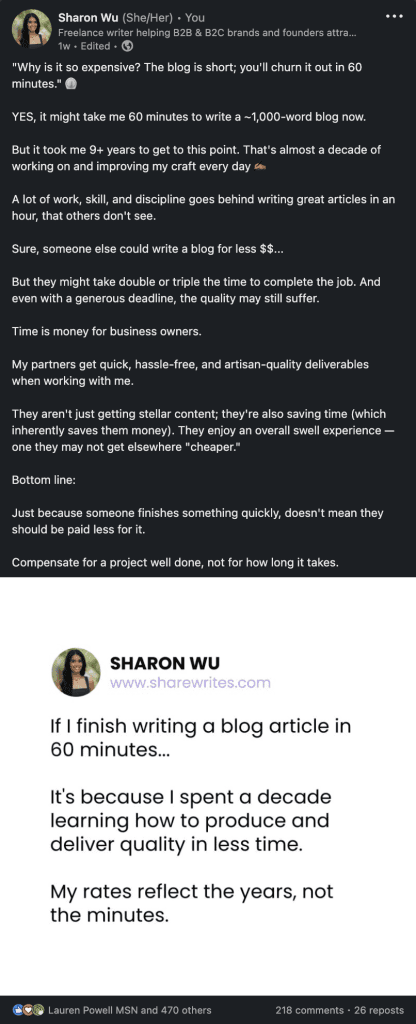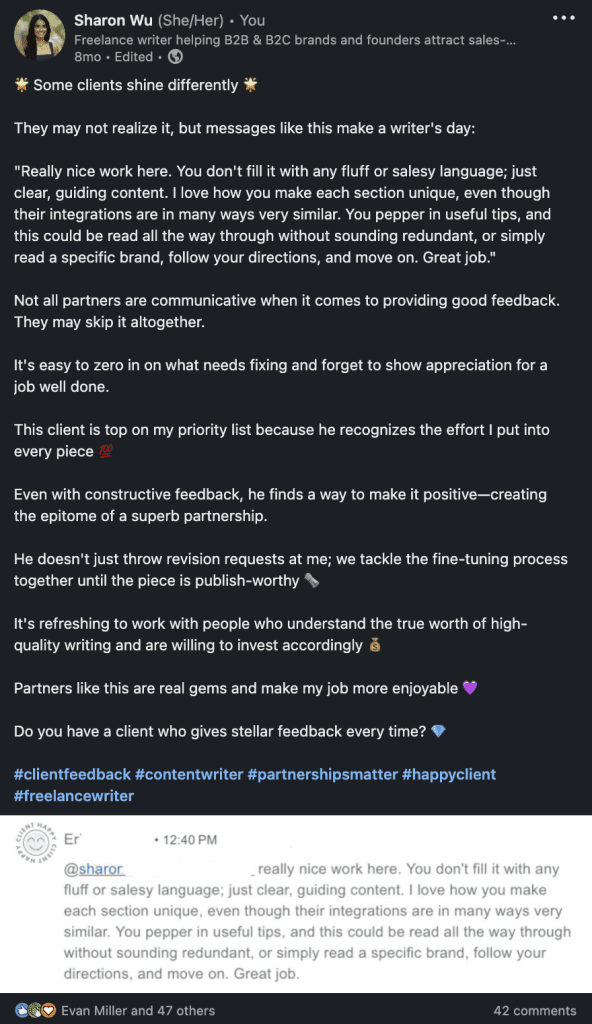As a business owner, you know quality content is critical for attracting customers, establishing trust, and driving revenue growth. But between managing operations, finances, marketing, sales, and everything in between…
Who has extra hours in the day to dedicate to writing?
This struggle is why thousands of companies partner with freelance writers like myself. We handle the demanding process of researching, writing, and editing — so you can focus on high-level priorities that move the needle.
Learn how partnering with a freelance writer can elevate your business. To help you get the ball rolling, I’ll share actionable tips for finding, vetting, and working with the best writers.
Why partner with a freelance writer?
Let’s first cover why you should consider outsourcing content creation to a freelance writer:
1. Reclaim your time
Content creation is time-intensive. From ideation and research to writing and editing, high-quality content requires hours of work.
When you’re already juggling client work, meetings, administrative tasks, and more, adding content creation to your plate can push you into burnout.
Handing writing projects off to a freelancer lifts this burden so you can do what you do best and enjoy most. Have you wanted to attend more conferences or networking events to attract new leads? Now, you can.
2. Access premium writing talent
Professional freelance writers spend years honing their research, writing, and editing abilities. Well-crafted content holds readers’ attention, proves authority, and motivates action.
Just as there’s a difference between cutting your own hair and having it done by a professional stylist, there’s a notable distinction in quality when you work with someone who writes for a living.
I’ll leave you with this graphic — ’nuff said, right?

3. Gain an outside perspective
Coming up with fresh content ideas can be difficult on your own.
By hiring a freelance writer, you get innovative ideas and a new outlook on your brand that you may not have had before. They analyze your existing content to identify gaps and untapped opportunities tailored to your target customer.
4. Scale your content strategy
As you grow your business, your blog will demand a constant stream of high-quality content to attract and engage your audience.
But scaling content creation on your own is next to impossible. You’ll burn out fast trying to churn out enough writing to fuel your expanding goals. Partnering with a freelance writer allows you to publish more often without sacrificing quality.
5. Diversify your offerings
New products and services are pivotal for attracting prospects and incentivizing repeat purchases. But you can’t bring a new offer to market without investing serious time into development first.
This is where delegating content creation to a freelance writing partner pays dividends. It alleviates the writing burden from your plate, freeing up time for innovation.
Rather than spending hours writing blogs, emails, and social posts, redirect that time to accelerating key priorities:
- Market research and validation
- Building minimally viable products
- Brainstorming new product concepts
- Creating sales and marketing collateral
- Developing delivery frameworks and pricing
6. Save money by hiring per project
Partnering with freelance writers is often more cost-effective than hiring in-house writers.
These key factors contribute to the cost-savings:
- Project-based billing: Pay for each completed project instead of hours worked.
- No overhead expenses: In-house writers come with overhead costs like benefits, equipment, and office space. Freelancers cover their own overhead, keeping your costs dedicated to project fees.
- Flexible scaling: Scale the number of projects up and down as your content needs change, rather than supporting a fixed full-time salary. This flexibility prevents waste when you need less content.
- No training investment: Experienced freelance writers don’t need training. Their existing expertise translates to instant productivity.
The bottom line?
Dollar for dollar, freelancers deliver greater value and flexibility for your budget compared to in-house hires.
How to find a freelance writer who delivers
Ready to delegate writing and reap the rewards?
Here’s how to find a talented freelancer who will take your content to the next level:
Step 1: Define your content goals
Get crystal clear on what you want to achieve through expanded content creation.
Examples are:
- Convert more leads
- Increase website traffic
- Establish thought leadership
- Engage social media followers
- Release lead magnet content (like eBooks)
This clarity helps you communicate goals and expectations to potential freelance writers. It also ensures the partnership stays aligned on core objectives. Don’t expect your writer or ghostwriter to read your mind — because nobody knows your business like you do!
Step 2: Determine content types and topics
Outline the types of content you need, along with suggested topics.
For instance:
- Informative blogs: Keyword research, link building, email marketing strategies
- Guides: Beginner’s guide to X, insider tips for Y, top 10 mistakes to avoid for Z
- Social media posts: Bite-sized thought-leadership content, product launches, company culture spotlights
Giving writers insight into content types and your subject matter allows them to assess whether it aligns with their skills and interests.
Step 3: Vet writer qualifications
This is where many businesses trip up — they choose a writer within budget without vetting qualifications. Don’t make this mistake.
Carefully evaluate the following before hiring your writer:
- Reliability: Ask for references to verify they consistently deliver quality work on time. Look for testimonials on their LinkedIn pages and websites.
- Brand fit: Check their writing samples and social posts to get a feel for personality and voice. Do they resonate with your tone and style?
- Budget alignment: Discuss rates to ensure they work within your budget. Remember — quality writing is an investment.
- Skills and experience: Review samples and past work in your niche. Look for mastery of research, writing clarity, and editing skills.
- Adaptability: Look for writers who can write helpful content about diverse topics. This versatility prevents bottlenecks and shows that they can learn new things quickly.
Following a rigorous vetting process will save you time and headaches later. My clients often tell me that hiring cheap writers ends in subpar work requiring heavy revisions. You don’t want that.
Pro tip: All Things Freelance Writing has a vetted directory of freelance writers specializing in various niches. This is a great resource if you don’t know where to start looking for your ideal writer.

Should you hire a versatile writer or a niche-specific writer?
The answer comes down to your specific content needs and goals. But in many cases, partnering with an adaptable all-rounder can maximize value.
Why?
Versatile writers bring a wider range of experience with researching and writing about diverse topics. They can produce multifaceted content that appeals to different visitor segments.
For example, say your startup is in the eco-tourism space.
A versatile writer can cover expected subjects like destination guides, hotel reviews, and activity recommendations. They could also create content around foodie attractions, local culture, conservation efforts, and sustainability practices. This provides a well-rounded mix of content to attract and engage both niche eco-tourists and mainstream travelers.
Don’t get me wrong, though. There are certainly situations where a niche specialist could excel. For example, legal firms benefit from writers intimately familiar with industry terminology and focused practice areas.
Consider your goals and audience to determine if a generalist or specialist makes the most sense.
How to collaborate effectively with your freelance writer
So, you’ve found a freelance writer who checks all the boxes…
But the work doesn’t stop there. Fostering an effective partnership requires ongoing effort on your part, too.
Here are some best practices to set your writer up for success (yes, even those who need little to no hand-holding):
1. Have an onboarding call
Don’t just toss a project to your new freelance writer and expect them to figure it out.
Schedule an onboarding call to provide helpful background on your business, brand voice, target audience, and content objectives. Giving context helps the writer craft content tailored to your goals from day one.
Bonus: Email all this information. It can be helpful for the writer to be able to easily reference style guides and brand requirements this way.
2. Create a detailed brief
Even with a call, don’t rely solely on verbal explanations. Follow up with a detailed project brief for reference.
Include key information like:
- Deadline
- Project goals
- Tone guidelines
- Target audience
- Keyword research
- Formatting guidelines
- Preferred post structure
- List of competitors to know about
- Cornerstone content (internal links)
- Rough content outline with headings
- Specific talking points or topic examples you want to be covered
Thorough briefs prevent misalignment and ensure writers have all the information they need to excel.
3. Provide timely, actionable feedback
When you receive a draft, avoid giving vague feedback like “This is bad” or “I don’t like this.” It isn’t helpful.
Instead, provide clear, constructive suggestions to improve the content. Be specific on what needs changing for the next draft. Actionable feedback makes revisions smoother for everyone involved.
Something like this would be more helpful: “Great point, but let’s expand on this further. Can you talk about the benefits of X, and find a recent quote or stat to back it up?”
Pro tip: If possible, provide revision requests within 2 business days of draft delivery. This keeps your project fresh in mind so your writer can make those changes efficiently for you.
How to succeed with your freelance writer
Nailing the initial steps sets your freelance writing partnership up for success. But staying focused on improvement is how you optimize it for longevity.
Continue building rapport and trust
Great partnerships depend on open communication, not transactions.
Respond to emails within 1-2 business days — not just when you need something. Show you care, and they’ll reciprocate with loyalty and exceeding expectations on projects.
Pay fairly and on time
Don’t go off “market rates” that aren’t representative of individual talents. When a writer provides their rate, don’t try to lowball them or request free test articles. Not only is this unprofessional, it’s disrespectful.
Be ready to pay fair rates reflective of the writer’s expertise and experience. Compensate for tests too — even if it’s less than their asking rate. Fair pay keeps spirits and morale high.
On a related note, there’s nothing worse than having to chase unpaid invoices. So, pay your writers on time. Bonus points if you do it sooner than promised!
Applaud great work
Don’t forget to show appreciation and applaud your writers when they deliver exceptional work.
One of my clients is fantastic at this. He always recognizes my strengths, so I know how to continue exceeding his expectations. Plus, it’s a fantastic morale boost — especially during challenging projects.
Offer value beyond pay
Don’t take freelance talent for granted — they have options. If you want to retain top writers, look beyond compensation.
- Offer to connect them with influential people in your network
- Ask how you can help promote their personal brand and business
- Write a LinkedIn recommendation for them without them having to ask
These seemingly small actions make a big difference in strengthening partnerships.
Respect their process
You hired a writer for their expertise. So trust their process — even if unconventional to you — as long as they deliver quality work.
Imposing your way of doing things will only de-motivate creativity and problem-solving.
A fellow freelance writer recently shared a massive red flag with me:
“My client wants me to strictly write in the Google Doc they provide, so they can make sure I’m not copying and pasting text or using AI to help me write.”
I told him to run for the hills. Not just because it’s a ludicrous request, but because it signals a lack of respect for what he brings to the table.
Please don’t be this kind of client. If you can’t trust your freelance writer… that’s a big problem.
Embrace two-way feedback
Yes, provide feedback on drafts — but also ask for their input on how you can be a better partner.
Find out from your freelance writer:
- Are your briefs clear?
- Is your feedback easy to understand?
- Do you respond to emails quickly enough?
- Can the current workflow be improved — and if so, how?
This two-way street keeps improving the partnership for the long haul.
Invest in a top-notch freelance writer for exceptional returns
Let’s face it:
Not all writers are the same, and exceptional freelance writing talent is hard to find. In a sea of mediocre writers, the cream of the crop gets snatched up — fast.
But the payoff is immense for businesses willing to invest in premium writers. Their skills and expertise deliver ROI far beyond run-of-the-mill freelancers.
Ready to invest in superb content?
Let’s explore how we can partner to shape your brand’s future.
Frequently asked questions (FAQs)
How can a freelance writer help my business?
A skilled freelance writer helps you publish more high-quality content across your website, blog, and social channels. This expanded content attracts more visitors, establishes thought leadership, and drives more revenue. Hand off content writing so you can focus on core business priorities.
What types of content can a freelance writer create?
Freelance writers can produce all types of written content your business needs. Examples include blogs, social media posts, website copy, email newsletters, and case studies. Copywriters focus on sales-driven content, while content writers educate to convert sales-ready leads.
What’s a fair rate to pay a freelance writer?
Rates vary based on the writer’s skills, experience, your niche, and project scope. Quality writers charge at least 25 cents per word. Be prepared to pay more for top-tier talent.
Should I hire one go-to freelance writer or a few?
This depends on your budget and content needs. Hiring one primary writer builds a strong working relationship. But having a few vetted writers in your roster gives you more versatility to assign niche topics.
How do I find and vet qualified freelance writers?
Start by asking business contacts for referrals and reviewing writer portfolios. LinkedIn and dedicated directories like All Things Freelance Writing are great places to find excellent talent. Thorough vetting upfront ensures you hire quality talent ready to deliver.
This article was updated on 11/30/2023.




